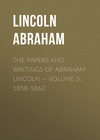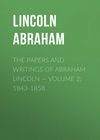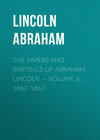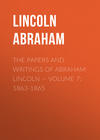Czytaj książkę: «The Papers And Writings Of Abraham Lincoln — Volume 5: 1858-1862», strona 21
It might seem, at first thought, to be of little difference whether the present movement at the South be called "secession" or "rebellion." The movers, however, well understand the difference. At the beginning they knew they could never raise their treason to any respectable magnitude by any name which implies violation of law. They knew their people possessed as much of moral sense, as much of devotion to law and order, and as much pride in and reverence for the history and government of their common country as any other civilized and patriotic people. They knew they could make no advancement directly in the teeth of these strong and noble sentiments. Accordingly, they commenced by an insidious debauching of the public mind. They invented an ingenious sophism which, if conceded, was followed by perfectly logical steps, through all the incidents, to the complete destruction of the Union. The sophism itself is that any State of the Union may consistently with the national Constitution, and therefore lawfully and peacefully, withdraw from the Union without the consent of the Union or of any other State. The little disguise that the supposed right is to be exercised only for just cause, themselves to be the sole judges of its justice, is too thin to merit any notice.
With rebellion thus sugar-coated they have been drugging the public mind of their section for more than thirty years, and until at length they have brought many good men to a willingness to take up arms against the government the day after some assemblage of men have enacted the farcical pretense of taking their State out of the Union, who could have been brought to no such thing the day before.
This sophism derives much, perhaps the whole, of its currency from the assumption that there is some omnipotent and sacred supremacy pertaining to a State — to each State of our Federal Union. Our States have neither more nor less power than that reserved to them in the Union by the Constitution — no one of them ever having been a State out of the Union. The original ones passed into the Union even before they cast off their British colonial dependence; and the new ones each came into the Union directly from a condition of dependence, excepting Texas. And even Texas in its temporary independence was never designated a State. The new ones only took the designation of States on coming into the Union, while that name was first adopted for the old ones in and by the Declaration of Independence. Therein the "United Colonies" were declared to be "free and independent States"; but even then the object plainly was not to declare their independence of one another or of the Union, but directly the contrary, as their mutual pledge and their mutual action before, at the time, and afterward, abundantly show. The express plighting of faith by each and all of the original thirteen in the Articles of Confederation, two years later, that the Union shall be perpetual, is most conclusive. Having never been States either in substance or in name outside of the Union, whence this magical omnipotence of "State rights," asserting a claim of power to lawfully destroy the Union itself? Much is said about the "sovereignty" of the States; but the word even is not in the national Constitution, nor, as is believed, in any of the State constitutions. What is "sovereignty" in the political sense of the term? Would it be far wrong to define it as "a political community without a political superior"? Tested by this, no one of our States except Texas ever was a sovereignty. And even Texas gave up the character on coming into the Union; by which act she acknowledged the Constitution of the United States, and the laws and treaties of the United States made in pursuance of the Constitution, to be for her the supreme law of the land. The States have their status in the Union, and they have no other legal status. If they break from this, they can only do so against law and by revolution. The Union, and not themselves separately, procured their independence and their liberty. By conquest or purchase the Union gave each of them whatever of independence or liberty it has. The Union is older than any of the States, and, in fact, it created them as States. Originally some dependent colonies made the Union, and, in turn, the Union threw off their old dependence for them, and made them States, such as they are. Not one of them ever had a State constitution independent of the Union. Of course, it is not forgotten that all the new States framed their constitutions before they entered the Union nevertheless, dependent upon and preparatory to coming into the Union.
Unquestionably the States have the powers and rights reserved to them in and by the national Constitution; but among these surely are not included all conceivable powers, however mischievous or destructive, but, at most, such only as were known in the world at the time as governmental powers; and certainly a power to destroy the government itself had never been known as a governmental, as a merely administrative power. This relative matter of national power and State rights, as a principle, is no other than the principle of generality and locality. Whatever concerns the whole should be confided to the whole — to the General Government; while whatever concerns only the State should be left exclusively to the State. This is all there is of original principle about it. Whether the national Constitution in defining boundaries between the two has applied the principle with exact accuracy, is not to be questioned. We are all bound by that defining, without question.
What is now combated is the position that secession is consistent with the Constitution — is lawful and peaceful. It is not contended that there is any express law for it; and nothing should ever be implied as law which leads to unjust or absurd consequences. The nation purchased with money the countries out of which several of these States were formed. Is it just that they shall go off without leave and without refunding? The nation paid very large sums (in the aggregate, I believe, nearly a hundred millions) to relieve Florida of the aboriginal tribes. Is it just that she shall now be off without consent or without making any return? The nation is now in debt for money applied to the benefit of these so-called seceding States in common with the rest. Is it just either that creditors shall go unpaid or the remaining States pay the whole? A part of the present national debt was contracted to pay the old debts of Texas. Is it just that she shall leave and pay no part of this herself?
Again, if one State may secede, so may another; and when all shall have seceded, none is left to pay the debts. Is this quite just for creditors? Did we notify them of this sage view of ours when we borrowed their money? If we now recognize this doctrine by allowing the seceders to go in peace, it is difficult to see what we can do if others choose to go or to extort terms upon which they will promise to remain.
The seceders insist that our Constitution admits of secession. They have assumed to make a national constitution of their own, in which of necessity they have either discarded or retained the right of secession as they insist it exists in ours. If they have discarded it, they thereby admit that on principle it ought not to be in ours. If they have retained it, by their own construction of ours, they show that to be consistent they must secede from one another whenever they shall find it the easiest way of settling their debts, or effecting any other selfish or unjust object. The principle itself is one of disintegration and upon which no government can possibly endure.
If all the States save one should assert the power to drive that one out of the Union, it is presumed the whole class of seceder politicians would at once deny the power and denounce the act as the greatest outrage upon State rights. But suppose that precisely the same act, instead of being called "driving the one out," should be called "the seceding of the others from that one," it would be exactly what the seceders claim to do, unless, indeed, they make the point that the one, because it is a minority, may rightfully do what the others, because they are a majority, may not rightfully do. These politicians are subtle and profound on the rights of minorities. They are not partial to that power which made the Constitution and speaks from the preamble calling itself "We, the People."
It may well be questioned whether there is to-day a majority of the legally qualified voters of any State except perhaps South Carolina in favor of disunion. There is much reason to believe that the Union men are the majority in many, if not in every other one, of the so-called seceded States. The contrary has not been demonstrated in any one of them. It is ventured to affirm this even of Virginia and Tennessee; for the result of an election held in military camps, where the bayonets are all on one side of the question voted upon, can scarcely be considered as demonstrating popular sentiment. At such an election, all that large class who are at once for the Union and against coercion would be coerced to vote against the Union.
It may be affirmed without extravagance that the free institutions we enjoy have developed the powers and improved the condition of our whole people beyond any example in the world. Of this we now have a striking and an impressive illustration. So large an army as the government has now on foot was never before known without a soldier in it but who has taken his place there of his own free choice. But more than this, there are many single regiments whose members, one and another, possess full practical knowledge of all the arts, sciences, professions, and whatever else, whether useful or elegant, is known in the world; and there is scarcely one from which there could not be selected a President, a Cabinet, a Congress, and perhaps a court, abundantly competent to administer the government itself. Nor do I say this is not true also in the army of our late friends, now adversaries in this contest; but if it is, so much better the reason why the government which has conferred such benefits on both them and us should not be broken up. Whoever in any section proposes to abandon such a government would do well to consider in deference to what principle it is that he does it; what better he is likely to get in its stead; whether the substitute will give, or be intended to give, so much of good to the people. There are some foreshadowings on this subject. Our adversaries have adopted some declarations of independence in which, unlike the good old one, penned by Jefferson, they omit the words "all men are created equal." Why? They have adopted a temporary national constitution, in the preamble of which, unlike our good old one, signed by Washington, they omit "We, the People," and substitute, "We, the deputies of the sovereign and independent States." Why? Why this deliberate pressing out of view the rights of men and the authority of the people?
This is essentially a people's contest. On the side of the Union it is a struggle for maintaining in the world that form and substance of government whose leading object is to elevate the condition of men to lift artificial weights from all shoulders; to clear the paths of laudable pursuit for all; to afford all an unfettered start, and a fair chance in the race of life. Yielding to partial and temporary departures, from necessity; this is the leading object of the government for whose existence we contend.
I am most happy to believe that the plain people understand and appreciate this. It is worthy of note that, while in this the government's hour of trial large numbers of those in the army and navy who have been favored with the offices have resigned and proved false to the hand which had pampered them, not one common soldier or common sailor is known to have deserted his flag.
Great honor is due to those officers who remained true, despite the example of their treacherous associates; but the greatest honor, and most important fact of all, is the unanimous firmness of the common soldiers and common sailors. To the last man, so far as known, they have successfully resisted the traitorous efforts of those whose commands, but an hour before, they obeyed as absolute law. This is the patriotic instinct of the plain people. They understand, without an argument, that the destroying of the government which was made by Washington means no good to them.
Our popular government has often been called an experiment. Two points in it our people have already settled — the successful establishing and the successful administering of it. One still remains — its successful maintenance against a formidable internal attempt to overthrow it. It is now for them to demonstrate to the world that those who can fairly carry an election can also suppress a rebellion; that ballots are the rightful and peaceful successors of bullets; and that when ballots have fairly and constitutionally decided, there can be no successful appeal back to bullets; that there can be no successful appeal, except to ballots themselves, at succeeding elections. Such will be a great lesson of peace: teaching men that what they cannot take by an election, neither can they take it by a war; teaching all the folly of being the beginners of a war.
Lest there be some uneasiness in the minds of candid men as to what is to be the course of the government toward the Southern States after the rebellion shall have been suppressed, the executive deems it proper to say it will be his purpose then, as ever, to be guided by the Constitution and the laws; and that he probably will have no different understanding of the powers and duties of the Federal Government relatively to the rights of the States and the people, under the Constitution, than that expressed in the inaugural address.
He desires to preserve the government, that it may be administered for all as it was administered by the men who made it. Loyal citizens everywhere have the right to claim this of their government, and the government has no right to withhold or neglect it. It is not perceived that in giving it there is any coercion, any conquest, or any subjugation, in any just sense of those terms.
The Constitution provides, and all the States have accepted the provision, that "the United States shall guarantee to every State in this Union a republican form of government." But if a State may lawfully go out of the Union, having done so it may also discard the republican form of government, so that to prevent its going out is an indispensable means to the end of maintaining the guarantee mentioned; and when an end is lawful and obligatory, the indispensable means to it are also lawful and obligatory.
It was with the deepest regret that the executive found the duty of employing the war power in defense of the government forced upon him. He could but perform this duty or surrender the existence of the government. No compromise by public servants could, in this case, be a cure; not that compromises are not often proper, but that no popular government can long survive a marked precedent that those who carry an election can only save the government from immediate destruction by giving up the main point upon which the people gave the election. The people themselves, and not their servants, can safely reverse their own deliberate decisions.
As a private citizen the executive could not have consented that these institutions shall perish; much less could he in betrayal of so vast and so sacred a trust as these free people had confided to him. He felt that he had no moral right to shrink, nor even to count the chances of his own life, in what might follow. In full view of his great responsibility he has, so far, done what he has deemed his duty. You will now, according to your own judgment, perform yours. He sincerely hopes that your views and your action may so accord with his as to assure all faithful citizens who have been disturbed in their rights of a certain and speedy restoration to them, under the Constitution and the laws.
And having thus chosen our course, without guile and with pure purpose, let us renew our trust in God, and go forward without fear and with manly hearts.
A. LINCOLN,
July 4, 1861
TO THE SECRETARY OF THE INTERIOR
EXECUTIVE MANSION, July 6, 1861
HON. SEC. OF INTERIOR.
MY DEAR SIR: — Please ask the Comr. of Indian Affairs, and of the Gen'l Land Office to come with you, and see me at once. I want the assistance of all of you in overhauling the list of appointments a little before I send them to the Senate.
Yours truly,
A. LINCOLN.
MESSAGE TO THE HOUSE OF REPRESENTATIVES
TO THE HOUSE OF REPRESENTATIVES:
In answer to the resolution of the House of Representatives of the 9th instant, requesting a copy of correspondence upon the subject of the incorporation of the Dominican republic with the Spanish monarchy, I transmit a report from the Secretary of State; to whom the resolution was referred.
WASHINGTON, July 11, 1861.
MESSAGE TO CONGRESS
TO THE SENATE AND HOUSE OF REPRESENTATIVES:
I transmit to Congress a copy of correspondence between the Secretary of State and her Britannic Majesty's envoy extraordinary and minister plenipotentiary accredited to this government, relative to the exhibition of the products of industry of all nations, which is to take place at London in the course of next year. As citizens of the United States may justly pride themselves upon their proficiency in industrial arts, it is desirable that they should have proper facilities toward taking part in the exhibition. With this view I recommend such legislation by Congress at this session as may be necessary for that purpose.
A. LINCOLN.
WASHINGTON, July 16, 1861
MESSAGE TO CONGRESS
TO THE SENATE AND HOUSE OF REPRESENTATIVES:
As the United States have, in common with Great Britain and France, a deep interest in the preservation and development of the fisheries adjacent to the northeastern coast and islands of this continent, it seems proper that we should concert with the governments of those countries such measures as may be conducive to those important objects. With this view I transmit to Congress a copy of a correspondence between the Secretary of State and the British minister here, in which the latter proposes, on behalf of his government, the appointment of a joint commission to inquire into the matter, in order that such ulterior measures may be adopted as may be advisable for the objects proposed. Such legislation recommended as may be necessary to enable the executive to provide for a commissioner on behalf of the United States:
WASHINGTON, JULY 19, 1861. A. LINCOLN.
TO THE ADJUTANT-GENERAL
WASHINGTON, JULY 19, 1861
ADJUTANT-GENERAL:
I have agreed, and do agree, that the two Indian regiments named within shall be accepted if the act of Congress shall admit it. Let there be no further question about it.
A. LINCOLN.
MEMORANDA OF MILITARY POLICY SUGGESTED BY THE BULL RUN DEFEAT. JULY 23,
1861
1. Let the plan for making the blockade effective be pushed forward with all possible despatch.
2. Let the volunteer forces at Fort Monroe and vicinity under General Butler be constantly drilled, disciplined, and instructed without more for the present.
3. Let Baltimore be held as now, with a gentle but firm and certain hand.
4. Let the force now under Patterson or Banks be strengthened and made secure in its position.
5. Let the forces in Western Virginia act till further orders according to instructions or orders from General McClellan.
6. [Let] General Fremont push forward his organization and operations in the West as rapidly as possible, giving rather special attention to Missouri.
7. Let the forces late before Manassas, except the three-months men, be reorganized as rapidly as possible in their camps here and about Arlington.
8. Let the three-months forces who decline to enter the longer service be discharged as rapidly as circumstances will permit.
9. Let the new volunteer forces be brought forward as fast as possible, and especially into the camps on the two sides of the river here.
When the foregoing shall be substantially attended to:
1. Let Manassas Junction (or some point on one or other of the railroads near it) and Strasburg be seized, and permanently held, with an open line from Washington to Manassas, and an open line from Harper's Ferry to Strasburg the military men to find the way of doing these.
2. This done, a joint movement from Cairo on Memphis; and from Cincinnati on East Tennessee.




















